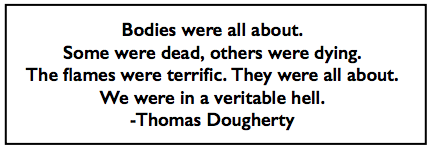 ———-
———-
Hellraisers Journal – Wednesday May 2, 1900
Scofield, Utah – Awful Mine Disaster Leaves Hundreds of Widows and Orphans
From The Salt Lake Herald of May 2, 1900:
[More than 100 Utah families left bereft and destitute:]
 ———-
———-
Hellraisers Journal – Wednesday May 2, 1900
Scofield, Utah – Awful Mine Disaster Leaves Hundreds of Widows and Orphans
From The Salt Lake Herald of May 2, 1900:
[More than 100 Utah families left bereft and destitute:]
 ———-
———-
Hellraisers Journal – Thursday March 8, 1900
Red Ash, West Virginia – Explosion Brings Death to Coal Miners
From The New York Times of March 7, 1900:
Fire Creek, W. Va., March 6.-The most disastrous mine explosion ever known in the New River District occurred at the Red Ash Mine shortly after the miners went to work this morning. Although the most heroic work of the rescuing party has been going on incessantly all day and night it is impossible tonight to estimate the full extent of the loss of life and property.
The most reliable estimates obtainable put the number of the victims at nearly 50. The capacity of the mine is 175, but there have been only 130 on the payrolls so far this month. The manager, Superintendent, bosses, bookkeepers, and others are busy with the force of rescuers, but at the same time they are all very reticent as to the extent of the casualties and any other information regarding the disaster.
More than fifty dead bodies have already been taken out, thirty-eight of which have been identified and are lying in their former homes. It is thought tonight that at least seventy-five miners are yet entombed in the wrecked mine.
Most of the bodies that cannot be identified or recognized have been placed in the large blacksmith’s shop of the Red Ash Coal Company, and that place presents the appearance of a horrible morgue. Although the bodies are mangled beyond recognition, yet they are surrounded by those who are in distress and hunting their lost friends.
The general belief is that the explosion occurred by contact of the miners’ lights with dust when the miners entered this morning.
Those working on the rescue relays say that the scene becomes more terrible as they get further into the mine. The men become almost faint of heart when they strike a place filled with dead bodies. The work of rescue is being continued during the night, and will be kept up until the mine is clear.

Hellraisers Journal – Saturday February 5, 1910
Trinidad, Colorado – Primero Mine Disaster Leaves 300-400 Children Fatherless
From The Fort Collins Express of February 3, 1910:
—–
THE REPORT OF THE EXPLOSION REACHED HERE AT SIX O’CLOCK TONIGHT BY A MESSENGER AND TELEPHONE THE WIRES WERE PURPOSELY CUT OR WERE BROKEN BY SOME UNKNOWN CAUSE BETWEEN HERE AND THE SCENE OF THE DISASTER, FOR JUST AFTER THE EXPLOSION THE WIRES PUT OUT OF COMMISSION AND ONLY MEAGER NEWS HAS BEEN RECEIVED FROM THE MINE.
At 11:30 tonight a messenger reported from a point about half way between here and Primero that fifteen bodies bad been recovered and that 135 more were in the mine with no hope of being rescued alive.
The cause of the explosion is unknown. A rescue party that left this city is expected back about 2 o’clock in the morning with complete reports of the disaster.
The criticism being directed against the company owning the mine is very severe as there is an apparent attempt to prevent the details from being made public. A large number of men who worked in the mine live in Trinidad, going back and forth on miners’ trains each morning and evening. Great excitement prevails in this city among the wives and children of the entombed men.
———-
 ———-
———-
Hellraisers Journal – Saturday January 8, 1910
Cherry, Illinois – Scene of Mass Murder of Men and Boys, Part II
From the International Socialist Review of January 1910:
The Cherry Mine Murders.
—–Why Four Hundred Workers Were Burned and Suffocated
in a Criminal Fire Trap.
—–By J. O. Bentall.
—–[Part II of II.]
Little Albert Buckle, 15 years old November 28, who escaped on the last car up, and his mother and sister stood at the ropes all day watching for “Rich,” who was 16 years the 21st of last June, and who had worked in the mine ever since his father was killed three years ago, but poor Richard was not brought up that day. On Monday I went to see the broken-hearted mother but I could not comfort her.
 ———-
———-
Hellraisers Journal – Friday January 7, 1910
Cherry, Illinois – Scene of Mass Murder of Men and Boys, Part I
From the International Socialist Review of January 1910:
[Part I of II.]
AS your brother one of the four hundred who perished in the Cherry coal mine November 13th? Or was it your father? Your husband? Your son? My brother was there. My father. My son. I helped carry them out. They were cold in death. They were covered with coal dust and swollen from black damp.
I am telling you this story from what I have seen with my own eyes. Not from hearsay.
I went from Chicago right to Cherry. With thousands of others I stood and looked from the outside. Then I broke through the line and joined the volunteer rescuers. I put on overalls, jacket, cap and lamp and went down into the tomb that contained over four hundred victims—a few living, most of them dead.
I helped plug the entries to prevent the fire from spreading. I had a hand in timbering where the roof was loose, or where collars were breaking. I cut legs off the dead mules so we could get them through the passageways and clear the track for bringing out the men. I was with the gang that found nineteen dead in one pile and twenty-one in another, thirty-seven in a third and one hundred and sixty-two in a fourth.
 ———-
———-
Hellraisers Journal – Wednesday November 17, 1909
Cherry, Illinois – Nurses Arrive from Chicago to Bring Comfort
From The Rock Island Argus of November 15, 1909:
[…..]
Thousands Come to Scene.
Thousands of people came to the mine this morning. Special trains bearing weeping relatives summoned by telegraph arrived at the station and heart-rending scenes were enacted as they met other relatives and were told the worst, which appears to be the only possible outcome of the disaster.
[…..]
Nurses Comfort Bereaved Ones.
A party of nurses from Chicago, who arrived last night, today were turned into comforters of the families probably bereft. Throughout the hamlet were scattered cottages in various stages of completion. It seems likely many cottages never will be finished…..
 ———-
———-
Hellraisers Journal – Tuesday November 16, 1909
Cherry, Illinois – Horror, Heroism and Heartbreak at Scene of Great Disaster.
Heartbreaking Scene at Cherry Mine Fire.
At the entrance of the shaft a scene was enacted such as is witnessed only at a disaster of this kind. Hundreds of screaming women, weeping children and frantic but helpless men crowded about the place.
A few survivors were surrounded by groups of the women, and the answers of these men to the shrieked inquiries only added to the terror of the women. Almost to a man the survivors declared that there was no hope for those still in the mine. Nearly two hundred of the men imprisoned, they declared, were in the third vein, the only entrance to which was from the second vein, almost five hundred feet from the main shaft of the pit.
[Photograph added.]
From the New York Tribune of November 14, 1909:
—–
 ———-
———-
Hellraisers Journal – Friday June 6, 1919
Wilkes-Barre, Pennsylvania – Coal Miners Perish in Flames of Mine Fire
From Pennsylvania’s Harrisburg Telegraph of June 5, 1919:
—–
Sparks Ignite Powder
More than 100 mine workers were riding to their work crowded into what is known as a “trip” of mine cars, drawn by a motor. The rear car carried twelve kegs of black powder used for blasting loose the coal in the chambers. When the train had gone about 200 feet from the entrance the trolley wire snapped. The sparks it emitted touched off the powder.
There was a roar and in an instant every man and boy on the train was either dead or dying. Mangled bodies were found everywhere by the rescue crews which rushed into the mine. Fire fighters, working frantically, soon succeeded in subduing the flames which followed the blast. Those who had not already succumbed were so badly burned that in nearly every case death was a matter of only a short time.
Continue reading “Hellraisers Journal: Explosion and Fire Kills 78 Coal Miners at the Baltimore No. 2 Tunnel at Wilkes-Barre, Pennsylvania”

Hellraisers Journal – Thursday January 14, 1909
Switchback, West Virginia – Second Disaster in Two Weeks Devastates Hamlet
From The Fairmont West Virginian of January 12, 1909:
WELCH, W. Va., Jan. 12.-One hundred miners were caught to-day in a second explosion in the Lick Branch Collieries. Hardly had the crape been taken from the door of many humble little homes than the explosions which now promises to be more direful than the one two weeks ago in which half a hundred lives were lost occurred and brought additional sorrow. Fathers and brothers of some of those killed in the last explosion are known to have been in the mine at 8:30 this morning when the second explosion occurred. The explosion occurred just half an hour after the full quota of men for the day shift had gone to work. It is known that 250 miners were on duty at the time. The details are meagre.
———-
[Emphasis added.]
From The Fairmont West Virginian of January 14, 1909:
Pray for the dead and fight like hell for living.
-Mother Jones
~~~~~~~~~~~~~~~~~~~~~~~~~~~~~~~~~~~~~~~~~~~~~
Hellraisers Journal – Saturday January 2, 1909
Switchback, McDowel County, West Virginia – Horror at Lick Branch Mine
From the Charleston Labor Argus of December 31, 1908:
HORRIBLE DISASTER
—–
In Another “Model” West Virginia Mine
in Which Scores of Miners
Met Their Death.
—–
Another mine disaster was added to the long list that have occurred in the non-union fields of this state, on Tuesday at the Lick Branch mine in the Norfolk & Western field. Twenty-seven bodies had been recovered up to last night and it is estimated that the death roll will reach nearly one hundred.
Mine cars were shattered and debris was blown out of the entrances and a hundred feet away from the mines mouth. Eight crews or rescuers are at work and have been engaged in the search of bodies.
In a large building near the mines a temporary morgue has been established. There are many pitiful scenes about the little village. Watchers sit side by side of coffins in some homes of which there are three.
The explosion occurred in a mine that was looked upon as a “model” colliery. It was visited by the “legislative investigating committee” when that body toured the state and all pronounced it one of the “safest” and best equipped mines in the state.
———-
[Inset added from Pittsburgh Gazette Times of January 1, 1909.]